- Home
- Patricia Cornwell
Cause Of Death ks-7 Page 12
Cause Of Death ks-7 Read online
Page 12
"Doc, I got to ask you something," he finally spoke as the rhythm of chains slowed at the toll booth. "Do you think Lucy's doing okay?"
"Everyone has nightmares," I said.
"Hey, Bonita," he called to the toll taker as he handed his pass card out the window, "when you going to do something about this weather?"
"Don't you be blaming this on me, Cap'n." She returned his card, and the gate lifted. "You told me you're in charge."
Her mirthful voice followed us as we drove on, and I thought how sad it was that we lived in a day when even toll booth attendants had to wear plastic gloves for fear they may come in contact with someone else's flesh. I wondered if we would reach a point when all of us lived in bubbles so we did not die of diseases like the Ebola virus and AIDS.
"I just think she's acting a little weird," Marino went on as his window rolled up. After a pause, he asked, "Where's Janet?"
"With her family in Aspen, I think."
He stared straight ahead and drove.
"After what happened at Dr. Mant's house, I don't blame Lucy for being a little rattled," I added.
"Hell, she's usually the one who looks for trouble," he said. "She doesn't get rattled. That's why the Bureau lets her hang out with HRT. You ain't allowed to get rattled when you're dealing with white supremacists and terrorists.
You don't call in sick because you've had a friggin' bad dream."
Off the expressway, he took the Seventh Street exit into the old cobblestone lanes of Shockoe Slip, then turned north onto Fourteenth, where I went to work every day when I was in town. Virginia's Office of the Chief Medical Examiner, or OCME, was a squat stucco building with tiny dark windows that reminded me of unattractive, suspicious eyes. They overlooked slums to the east and the banking district to the west, and suspended overhead were highways and railroad tracks cutting through the sky.
Marino pulled into the back parking lot, where there was an impressive number of cars, considering the condition of the roads. I got out in front of the shut bay door and used a key to enter another door to one side. Following the ramp intended for stretchers, I entered the morgue, and could hear the noise of people working down the hall. The autopsy suite was past the walk-in refrigerator, and doors were open wide. I walked in while Fielding, my deputy chief, removed various tubes and a catheter from the body of a young woman on the second table.
"You ice-skate in?" he asked and he did not seem surprised to see me.
"Close to it. I may have to borrow the wagon today. At the moment I'm without a car."
He leaned closer to his patient, frowning a bit as he studied the tattoo of a rattlesnake coiled around the dead woman's sagging left breast, its gaping mouth disturbingly aimed at her nipple.
"You tell me why the hell somebody gets something like this," Fielding said.
"I'd say the tattoo artist got the best end of that deal," I said. "Check the inside of her lower lip. She's probably got a tattoo there."
He pulled down her lower lip, and inside it in big crooked letters was Fuck You.
Fielding looked at me in astonishment. "How'd you know that?"
"The tattoos are homemade, she looks like a biker-type and my guess is she's no stranger to jail."
"Right on all counts." He crabbed a clean towel and wiped his face.
My body-building associate always looked as if he were about to split his scrubs, and he perspired while the rest of us were never quite warm. But he was a competent forensic pathologist. He was pleasant and caring, and I believed he was loyal.
"Possible overdose," he explained as he sketched the tattoo on a chart. "I guess her New Year was a little too happy-"
"Jack," I said to him, "how many dealings have you had with the Chesapeake police?"
He continued to draw. "Very little."
"None recently?" I asked.
"I really don't think so. Why?" He glanced up at me.
"I had a rather odd encounter with one of their detectives."
"in connection with Eddings?" He began to rinse the body, and long dark hair flowed over bright steel.
"Right."
"You know, it's weird but Eddings had just called me.
It couldn't have been more than a day before he died," Fielding said as he moved the hose.
"What did he want?" I asked.
"I was down here doing a case, so I never talked to him.
Now I wish I had." He climbed up a stepladder and began taking photographs with a Polaroid camera. "You in town long?"
"I don't know," I said.
"Well, if you need me to help out in Tidewater some, I will." The flash went off and he waited for the print. "I don't know if I told you, but Ginny's pregnant again and would probably love to get out of the house. And she likes the ocean. Tell me the name of the detective you're worried about, and I'll take care of him."
"I wish somebody would," I said.
The camera flashed again, and I thought about Mant's cottage and could not imagine putting Fielding and his wife in there or even nearby.
"it makes sense for you to stay here anyway," he added.
"And hopefully Dr. Mant isn't going to stay in England forever."
"Thank you," I said to him with feeling. "Maybe if you could just commute several times a week."
"No problem. Could you hand me the Nikon?"
"Which one?"
"Uh, the N-50 with the single-reflex lens. I think it's in the cabinet over there." He pointed.
"We'll work out a schedule," I said as I got the camera for him. "But you and Ginny don't need to be in Dr. Mant's house, and you're going to have to trust me on that."
"You have a problem?" He ripped out another print and handed it down.
"Marino, Lucy and I started our New Year with slashed tires."
He lowered the camera and looked at me, shocked.
"Shit. You think it was random?"
"No, I do not," I said.
I took the elevator up to the next floor and unlocked my office and the sight of Eddings' Christmas pepper surprised me like a blow. I could not leave it on the credenza, so I picked it up and then did not know where to move it. For a moment, I walked around, confused and upset, until I finally put it back where it had been, because I could not throw it out or subject some other member of my staff to its memories.
Looking through Rose's adjoining doorway, I was not surprised that she wasn't here. My secretary was advancing in years and did not like to drive downtown even on the nicest days. Hanging up my coat, I carefully looked around, satisfied that all seemed in order except for the cleaning job done by the custodial crew that came in after hours. But then, none of the sanitation engineers, as they were called by the state, wanted to work in this building. Few lasted long and none would go downstairs.
I had inherited my quarters from the previous chief, but beyond the paneling, nothing was as it had been back in those cigar-smoky days when forensic pathologists like Cagney nipped bourbon with cops and funeral home directors, and touched bodies with bare hands. My predecessor had not worried much about alternate light sources and DNA.
I remembered the first time I had been shown his space after he had died and I was being interviewed for his position. I had surveyed macho mementos he had proudly displayed, and when one of them turned out to be a silicone breast implant from a woman who had been raped and murdered, I had been tempted to stay in Miami.
I did not think the former chief would like his office now, for it was nonsmoking, and disrespect and sophomoric behavior were left outside the door. The oak furniture was not the state's but my own, and I had hidden the tile floor with a Sarouk prayer rug that was machine-made but bright.
There were corn plants and a ficus tree, but I did not bother with art, because like a psychiatrist, I wanted nothing provocative on my walls, and frankly, I needed all the space I could find for filing cabinets and books. As for trophies, Cagney would not have been impressed with the toy cars, trucks and trains I used to help investigators r
econstruct accidents.
I took several minutes to look through my in-basket, which was full of red-bordered death certificates for medical examiner cases and green-bordered ones for those that were not. Other reports also awaited my initialing, and a message on my computer screen told me I needed to check my electronic mail. All that could wait, I thought, and I walked back out into the hall to see who else was here.
Only Cleta was, I discovered, when I reached the front office, but she was just who I needed to see.
"Dr. Scarpetta," she said, startled. "I didn't know you were here."
"I thought it was a good idea for me to return to Richmond right now," I said, pulling a chair close to her desk.
"Dr. Fielding and I are going to try to cover Tidewater from here."
Cleta was from Florence, South Carolina, and wore a lot of makeup and her skirts too short because she believed that happiness was being pretty, which was something she would never be. In the midst of sorting grim photographs by case number, she sat straight in her chair, a magnifying glass in hand, bifocals on. Nearby was a sausage biscuit on a napkin that she probably had gotten from the cafeteria next door, and she was drinking Tab.
"Well, I think the roads are starting to melt," she let me know.
"Good." I smiled. "I'm glad you're here."
She seemed very pleased as she plucked more photographs out of the shallow box.
"Cleta," I said, "you remember Ted Eddings, don't you?"
"Oh yes, ma'am." She suddenly looked as if she might cry. "He was always so nice when he would come in here. I still can't believe it." She bit her lower lip.
"Dr. Fielding says Eddings called down here the end of last week," I said. "I'm wondering if you might remember that."
She nodded. "Yes, ma'am, I sure do. In fact, I can't stop thinking about it."
"Did he talk to you?"
"Yes."
"Can you remember what he said?"
"Well, he wanted to speak to Dr. Fielding, but his line was busy. So I asked if I could take a message, and we kidded around some. You know how he was." Her eyes got bright and her voice wavered. "He asked me if I was still eating so much maple syrup because I had to be eating plenty of it to talk like this. And he asked me out."
I listened as her cheeks turned red.
"Of course, he didn't mean it. He was always saying, you know. "When are we going out on that date? He didn't mean it," she said again.
"It's all right if he did," I kindly told her.
"Well, he already had a girlfriend."
"How do you know that?" I asked.
"He said he was going to bring her by sometime, and I got the impression he was pretty serious about her. I believe her name is Loren, but I don't know anything else about her."
I thought of Eddings engaging in personal conversations like this with my staff, and was even less surprised that he had seemed to gain access to me more easily than most reporters who called. I could not help but wonder if this same talent had led to his death, and I suspected it had.
"Did he ever mention to you what he wanted to talk to Dr. Fielding about?" I said as I got up.
She thought hard for a moment, absently rummaging through pictures the world should never see. "Wait a minute. Oh, I know. It was something about radiation. About hat the findings would be if someone died from that."
"What kind of radiations" I said.
"Well, I was thinking he was doing some sort of story on X-ray machines. You know, there's been a lot in the news lately because of all the people afraid of things like letter bombs."
I did not recall seeing anything in Eddings' house that might indicate he was researching such a story. I returned to my office and started on paperwork and began returning telephone calls. Hours later, I was eating a late lunch at my desk when Marino walked in.
"What's it doing out there?" I said, surprised to see him.
"Would you like half a tuna fish sandwich?"
Shutting both doors, he sat with his coat still on, and the look on his face frightened me. "Have you talked to Lucy?" he said.
"Not since I left the house." I put the sandwich down. "Why?"
"She called me-he glanced at his watch-"roughly an hour ago. Wanted to know how to get in touch with Danny so she could call him about her car. And she sounded drunk."
I was silent for a moment, my eyes on his. I looked away.
I did not ask him if he were certain because Marino knew about such matters, and Lucy's past was quite familiar to him.
"Should I go home?" I quietly asked.
"Naw. I think she's in some kind of mood and is blowing things off. At least she's got no car to drive."
I took a deep breath.
"Point is, I think she's safe at the moment. But I thought you should know, Doc."
"Thank you," I grimly said.
I had hoped my niece's proclivity to abuse alcohol was a problem she had left behind, for I had seen no worrisome signs since those early self-destructive days when she had driven drunk and almost died. If nothing else, her odd behavior at the house this morning in addition to what Marino had just revealed made me know that something was very wrong. I wasn't certain what to do.
"One other thing," he added as he got up. "You don't want her going back to the Academy like this."
"No," I said. "Of course not."
He left, and for a while I stayed behind shut doors, depressed, my thoughts like the sluggish river behind my house. I did not know if I was angry or frightened, but as I thought of the times I had offered wine to Lucy or gotten her a beer, I felt betrayed. Then I was almost desperate as I considered the magnitude of what she had accomplished, and what she had to lose, and suddenly other images came to me, too. I envisioned terrible scenes penned by a man who wanted to be a deity, and I knew that my niece with all her brilliance did not understand the darkness of that power. She did not understand malignancy the way I did.
I put my coat and gloves on, because I knew where I should go. I was about to let the front office know I was leaving, when my phone rang, and I picked it up in the ent it might be Lucy. But it was the Chesapeake police
chief, who told me his name was Steels and that he had just moved here from Chicago.
"I'm sorry this is the way we have to meet," he said, and he sounded sincere. "But I need to talk to you about a detective of mine named Roche."
"I need to talk to you about him, too," I said. "Maybe you can explain to me exactly what his problem is."
"According to him, the problem's you," he said.
"That's ridiculous," I said, unable to restrain my anger.
"To cut to the chase, Chief Steels, your detective is inappropriate, unprofessional and an obstruction in this investigation. He is banned from my morgue."
"You realize Internal Affairs is going to have to thoroughly investigate this," he said, "and I'm probably going to need you to come in at some point so we can talk to you., I
"Exactly what is the accusation?"
"Sexual harassment."
"That's certainly popular these days," I ironically said.
"However, I wasn't aware I had power over him, since he works for you, not me, and by definition, sexual harassment is about the abuse of power. But it's all moot since the roles are reversed in this case. Your detective is the one who made sexual advances toward me, and when they were not reciprocated, he's the one who became abusive."
Steels said after a pause, "Then it sounds to me like it's your word against his."
"No, what it sounds like is a lot of bullshit. And if he touches me one more time, I will get a warrant and have him arrested."
He was silent.
"Chief Steels," I went on, "I think what should be of glaring importance right now is a very frightening situation that is going on in your jurisdiction. Might we talk about Ted Eddings for a moment?"
He cleared his throat. "Certainly."
"You're familiar with the case?"
"Absolutely. I've been thoroughly
briefed and am very familiar with it."
"Good. Then I'm sure you'll agree that we should investigate it to our fullest capacity."
"Well, I think we should look hard at everybody who dies, but in the Eddings case the answer's pretty plain to me."
I listened as I got only more furious.
"You may or may not know that he was into Civil War stuff-had a collection, and all. Apparently, there were some battles not so far from where he went diving, and it may be he was looking for artifacts like cannonballs."
I realized that Roche must have talked to Mrs. Eddings, or perhaps the chief had seen some of the newspaper articles Eddings supposedly had written about his underwater treasure hunts. I was no historian, but I knew enough to see the obvious problem with what was becoming a ridiculous theory.
I said to Steels, "The biggest battle on or near water in your area was between the Merrimac and the Monitor. And that was miles away in Hampton Roads. I have never heard of any battles in or near the part of the Elizabeth River where the shipyard is located."
"But Dr. Scarpetta, we really just don't know, do we?"
he thoughtfully said. "Could be anything that was fired, any garbage dumped and anybody killed at any place back then. It's not like there were television cameras or millions of reporters all over. Just Mathew Brady, and by the way, I'm a big fan of history and have read a lot about the Civil War. I'm personally of the belief that this guy, Eddings.
went down in that shipyard so he could comb the river bottom for relics. He inhaled noxious gases from his machine and died, and whatever he had in his hands-like a metal detector-got lost in the silt."
"I am working this case as a possible homicide," I firmly said.
"And I don't agree with you, based on what I've been told.
"I expect the prosecutor will agree with me when I speak to her."
The chief said nothing to that.
"I should assume you don't intend to invite the Bureau's Criminal Investigative Analysis people into this," I added.
"Since you have decided we're dealing with an accident."

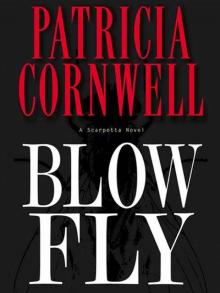 Blow Fly
Blow Fly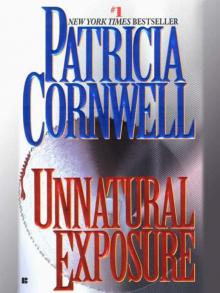 Unnatural Exposure
Unnatural Exposure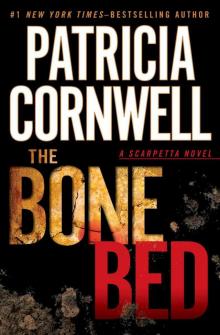 The Bone Bed
The Bone Bed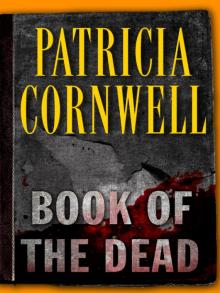 Book of the Dead
Book of the Dead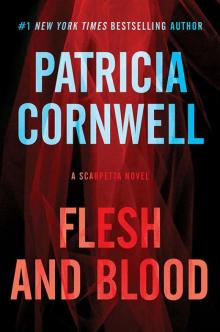 Flesh and Blood: A Scarpetta Novel (Scarpetta Novels Book 22)
Flesh and Blood: A Scarpetta Novel (Scarpetta Novels Book 22)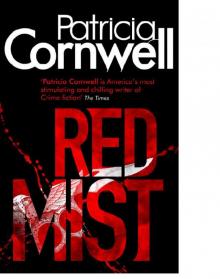 Red Mist
Red Mist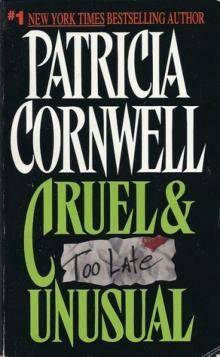 Cruel & Unusual
Cruel & Unusual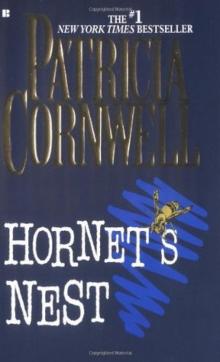 Hornet's Nest
Hornet's Nest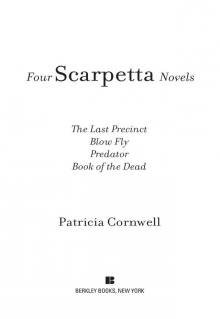 Four Scarpetta Novels
Four Scarpetta Novels Scarpetta's Winter Table
Scarpetta's Winter Table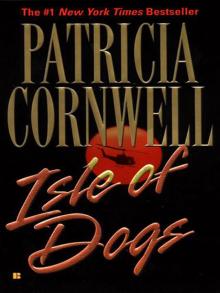 Isle of Dogs
Isle of Dogs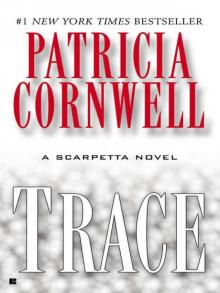 Trace
Trace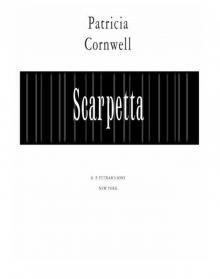 Postmortem
Postmortem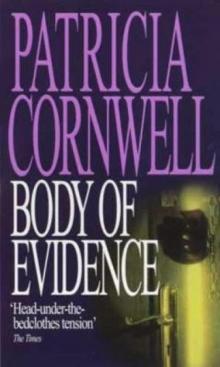 Body of Evidence ks-2
Body of Evidence ks-2 Southern Cross
Southern Cross All That Remains
All That Remains Point of Origin
Point of Origin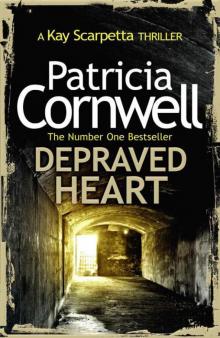 Depraved Heart
Depraved Heart Ruth, a Portrait: The Story of Ruth Bell Graham
Ruth, a Portrait: The Story of Ruth Bell Graham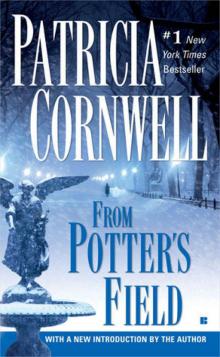 From Potter's Field
From Potter's Field Flesh and Blood
Flesh and Blood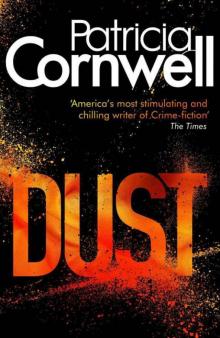 Dust
Dust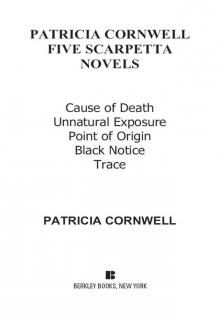 The Body Farm
The Body Farm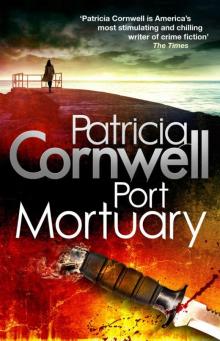 Port Mortuary
Port Mortuary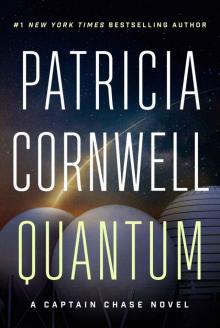 Quantum
Quantum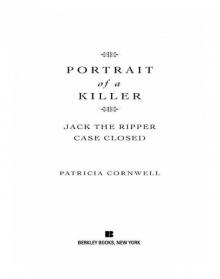 Portrait of a Killer: Jack the Ripper - Case Closed
Portrait of a Killer: Jack the Ripper - Case Closed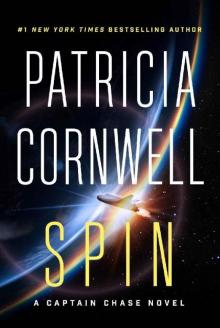 Spin (Captain Chase)
Spin (Captain Chase)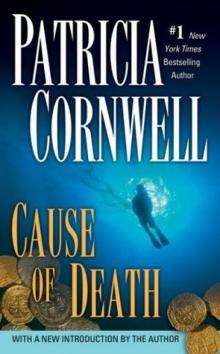 Cause of Death
Cause of Death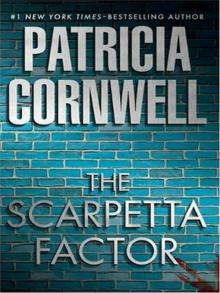 The Scarpetta Factor
The Scarpetta Factor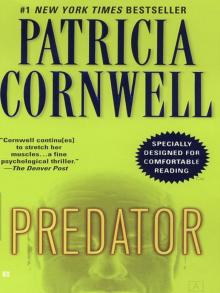 Predator
Predator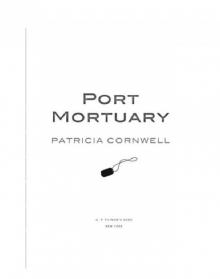 Scarpetta 18 - Port Mortuary
Scarpetta 18 - Port Mortuary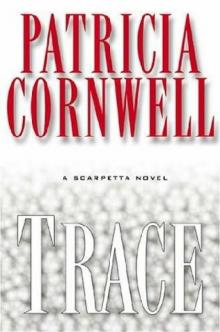 Trace ks-13
Trace ks-13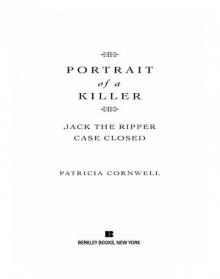 Portrait of a Killer
Portrait of a Killer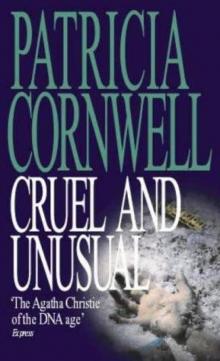 Cruel and Unusual ks-4
Cruel and Unusual ks-4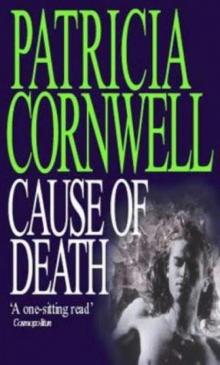 Cause Of Death ks-7
Cause Of Death ks-7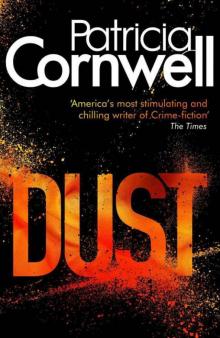 Dust ks-21
Dust ks-21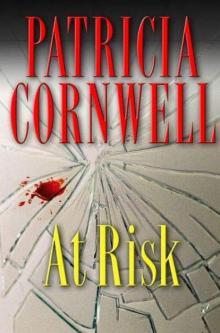 At Risk wg-1
At Risk wg-1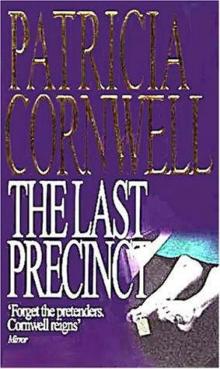 The Last Precinct ks-11
The Last Precinct ks-11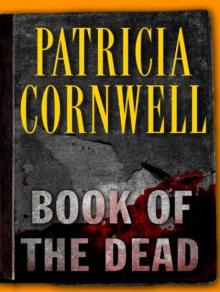 Book of the Dead ks-15
Book of the Dead ks-15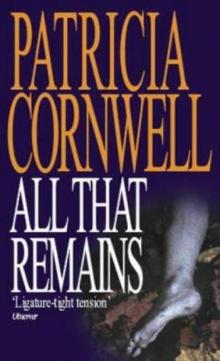 All That Remains ks-3
All That Remains ks-3 Ruth, a Portrait
Ruth, a Portrait Scarpetta's Winter Table (kay scarpetta)
Scarpetta's Winter Table (kay scarpetta) From Potter's Field ks-6
From Potter's Field ks-6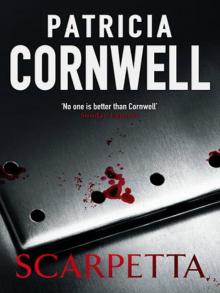 Scarpetta
Scarpetta Isle of Dogs jhabavw-3
Isle of Dogs jhabavw-3 Hornet's Nest jhabavw-1
Hornet's Nest jhabavw-1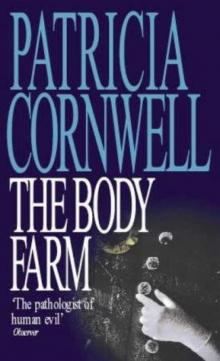 The Body Farm ks-5
The Body Farm ks-5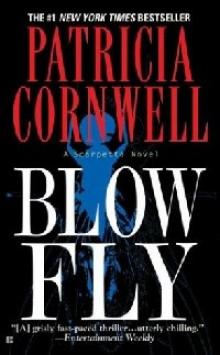 Blow Fly ks-12
Blow Fly ks-12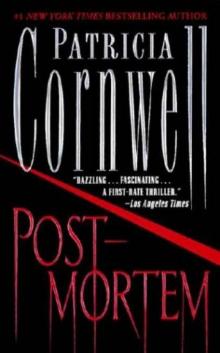 Post Mortem
Post Mortem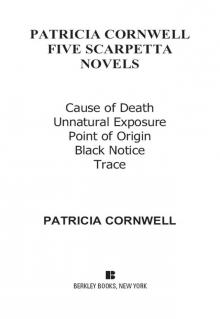 Five Scarpetta Novels
Five Scarpetta Novels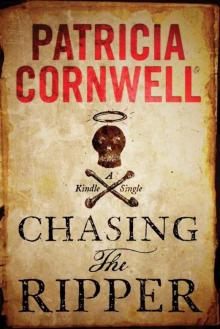 Chasing the Ripper (Kindle Single)
Chasing the Ripper (Kindle Single)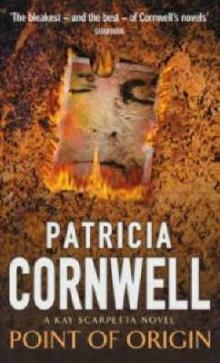 Point of Origin ks-9
Point of Origin ks-9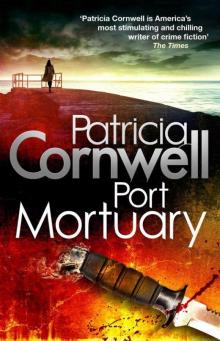 Port Mortuary (2010)
Port Mortuary (2010)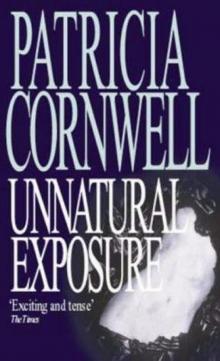 Unnatural Exposure ks-8
Unnatural Exposure ks-8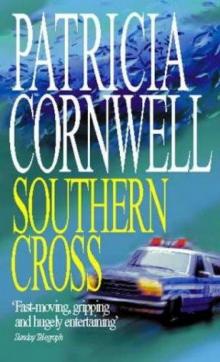 Southern Cross uhabavw-2
Southern Cross uhabavw-2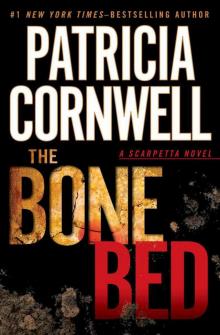 The Bone Bed ks-20
The Bone Bed ks-20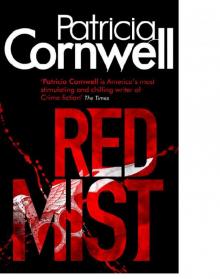 Red Mist ks-19
Red Mist ks-19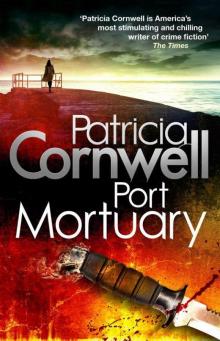 Port Mortuary (2010) ks-18
Port Mortuary (2010) ks-18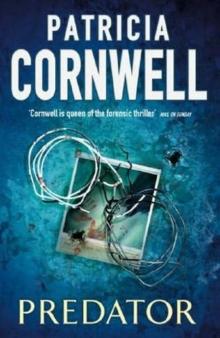 Predator ks-14
Predator ks-14